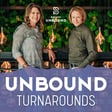
15. Become an Epicenter of Resilience with Lorca Smetana
Sit next to her on a plane, ask what she does, and she’ll say “I grow resilience in people.”
Lorca Smetana has learned how to be with hard things beautifully—but that wisdom came at a cost. After surviving the Mt. Hood climbing tragedy at sixteen, she quickly realized ‘security’ doesn’t exist. Life is unpredictable, and our only real choice is how we show up in the face of uncertainty.
As a Resilience Coach, she acts as a ‘wilderness guide to the self’ for those who crave deeper confidence, peace, and self-trust. She teaches how to heal what hasn’t happened yet. She cultivates healthy emotional ecosystems. She reveals the path to joy independent of circumstance.
Some clients find solace at Lorca’s Montana farm, where she raises Icelandic sheep and white homing pigeons. Others collaborate virtually as they learn about supported risk, shedding emotional armor, and identifying “the problems they do want.”
Hear how Lorca intertwines resilience and entrepreneurship in her own life and why her purpose in the world is NOT to create the perfect business. (Pssst…neither is yours!)
For more inspiration, subscribe to Unbound Turnarounds on Apple Podcasts or wherever you listen to podcasts!
LINKS:
- Connect with Nicole
- Connect with Mallory
- Connect with Lorca: www.lorcasmetana.com/about
